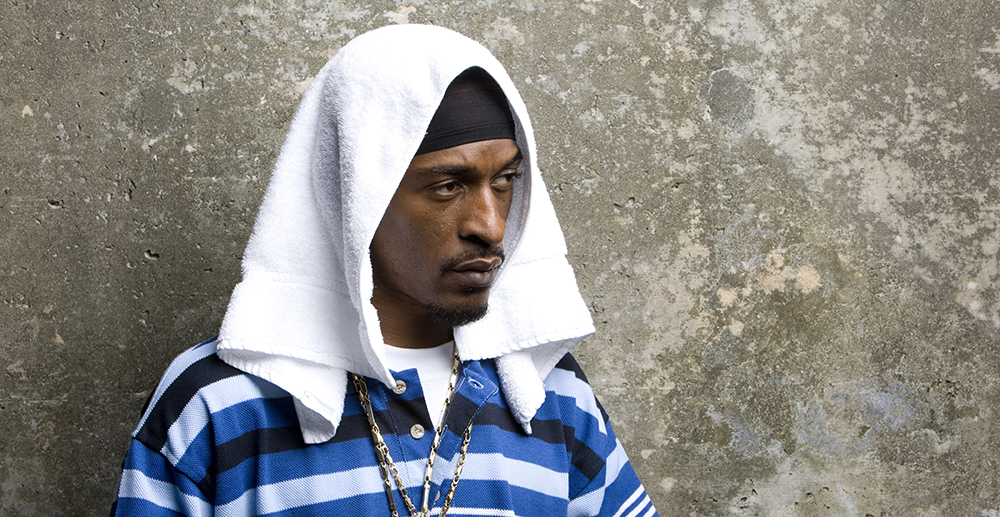Music
 Rakim // Photo: courtesy of Micheal Wong
Rakim // Photo: courtesy of Micheal Wong
Internationally Known Rakim Discusses Legacy, Technique At Kennedy Center
February 21, 2020 @ 12:00am
Writing hip-hop lyrics seems, sounds and definitely is, a daunting task. I’ve tried to write in rhyme via poetry, and let me tell you…it’s not easy. Add that to beats, drum rolls and whatever else those wizards known as producers throw in the background, and writing raps suddenly becomes radically more daunting than, say, writing a sentence. Maybe you’ve seen those books on the shelves that offer help with writing screenplays, novels or even love letters, but how many give you guidance on writing raps. Look, I’m sure you can Google anything and get results, so no I’m not saying NONE exist. Instead, let me be a more specific: How many of those books that offer said guidance on rapping are penned by Rakim, of famed duo Eric B. and Rakim? Just one.
One of the greatest MC’s of all time is currently on tour speaking about his one How-To, other part Memoir, Sweat The Technique: Revelations on Creativity from the Lyrical Genius, and his latest stop brings him to DC’s John F. Kennedy Center this Saturday at 7:30 p.m. The discussion will be moderated by collaborating writer Bakari Kitwana and features a DJ session by the equally celebrated Eric B. You’ve heard the music, and while the event page is coy on whether you will or won’t hear legacy tracks like “It’s Been A Long Time,” Rakim will inevitably touch on his journey from unheralded New York rhymer to one of the genre’s greatest gifts to music. Before he takes the stage to discuss his book and story, we were able to ask him a few questions in advance of his capital visit.
OT: Take me through your decision to write this book now, I’m sure you’ve had book offers in the past, so why was this moment the right time to deliver your memoir? How did you come to the conclusion to format it the way you did, one part memoir, one part explainer on writing music? Why did you think this was an effective way to tell your story?
Rakim: There have definitely been a lot of offers, but there wasn’t a lot of shared vision in what the book should be. Publishers wanted some exposé and call out piece, but no matter how many times it was asked, I’d never snitched with my music, so why would I do it in a book? That kind of book’s been done and, to me, the day-to-day gossip is way less interesting than what happens when I’m making music. Meeting Tracy Sherrod at Harper Collins changed the way I looked at what it could be. We decided if I could base the book around the creative process, my creative process, but also how that might translate for other artists in an almost mentoring way, I could write something special. We could use almost a student guide as a platform and then talk about my specific experiences and observations along the way.
So you start with how I think, how I write, what I believe it means to be an artist and then you build around that with personal stories that have real context and purpose. You can tell the story about Eric B and I going over to our first recording session with Marley Marl, and it’s a fun little story in and of itself. But when you frame it as part of a lifelong journey of being true to yourself as an artist, it becomes more than that. Not every artist is going to luck into sitting with the A-list producer of the day, but every reader is going to be confronted with a time where they are asked to bend, maybe break, from their inner sense of direction. So that little story, combined with other similar experiences, can become a lesson or at least a principle to reflect on.
OT: What are some aspects of how you approach writing that you discuss in the book that might be surprising to people who have listened to your music?
R: I think my fans are pretty in tune with the way I think and the references – both street and spiritual – that I intertwine throughout my rhymes. For them, this goes a little deeper down that path and really explores some of those cultural and intellectual themes of my music. The book pulls back the curtain on some of the more esoteric references – universal consciousness, the exploration of how musical frequencies can evoke emotion, how and why certain historic figures and moments resonate for me. And I like to think it could also serve as a gateway to people unfamiliar with Rakim or even uninterested in hip-hop. It let’s them see how all the words, ideas, memories and visions ricocheting around the mind of an songwriter get focused down through a pen and microphone or unleashed in front of an audience of thousands. It points them towards the X-factor. I’m not trying to say I hold the key to the universe of creativity, but I’ve been doing this day in, day out this for three or four decades, so I might have a little insight…a few tips and techniques.
OT: How does writing a book compare to writing music/poetry? How does your approach shift with the new medium?
R: To start, it never took me the better part of two years to write even my most complex rhyme. When I started, I was thinking it would just be like coming up with responses to another interview, just much longer. I was way off. But then I actually fell back into the process I use for writing music and things became more clear. I once heard Francis Ford Coppola say if you know the end of the movie, you can start writing backwards and the story will unfold itself, so sometimes I apply that to writing songs. When I’m putting rhymes on paper, I also will grid out the musical bars and use dots to mark where my emphasis has got to be. When I started to look at the book that way, knowing where I was going to end up and what and where those highlights needed to be, things started to come together. But there were still some false starts and compared to writing songs, ya know, long!! Real, real long. And I don’t even want to start about recording the audio book and I’ve spent most of my life in the booth.
OT: What were some challenges to constructing the book? Was it getting personal in a longform manner, was it just the formatting that I mentioned? What were some of the tougher moments?
R: Looking back at some of the big life moments like the passing of my father and then my mother. That was tough. Those aren’t emotions you really reflect on constantly, at least not at that level. Reading it back when we were recording was even harder. I’m a pretty strong willed and collected man, but you can hear me choke up more than once. In other places, the process of writing my experiences down opened me up to new interpretations. Some of the conflicts I’ve had, the struggles personally and professionally take on a different reflection when you have to dig deep into them. I don’t want to come off too cliché, but I learned about myself while trying to put together something meant to teach others.
OT: Your often cited as an influence and legend among hip-hop heads, when you look back on your career, how do you feel about your legacy?
R: I’m proud of the legacy. And I’m now more accepting of some of the accolades and think of them as true blessings. I’m confident in what I wrote and the songs that I recorded. I’m amazed and again blessed by the reactions I get from fans who come out to this day. But beyond the words on the paper, I’m happy with the way I played things out. The path I chose and a lot of the decisions I made. For better or worse, and there has been some [for] the worse but more of the better, I’ve been able to live a life and have a career true to the core purpose I believe in. I get into that in the book a lot.
OT: After years and years of performing for people with your music, how does the experience compare to your book tour, and that kind of event?
R: Well, I get to sit down for most of it, so that’s something different. At its surface, you might think it’s apples and oranges, but the energy and the connection is more similar than you’d expect. On stage, I know or at least get the feeling things are resonating because you’ve got all these people staring up at you, screaming and dancing. And they know all the words and rap right along with you. They’ve taken the time, consciously or not, to learn and think about songs and lyrics, so you gotta think it’s had some sort of affect on their lives. When I’m talking about the book, it might be a little more muted activity wise – no one has stage dived on the book tour yet – but that resonance is even more evident. When the audience reacts to what I’m saying and especially when they are asking questions, they’ve taken the time to think about my art, lyrics and life, and the way that it’s affected them shines through brightly.
OT: What does it mean to be able to bring your story to the Kennedy Center, does the venue’s history add significance to this particular tour spot?
R: It’s part of those accolades, those blessings I’m speaking of. Hip-hop started in the parks, in the basements and in the school cafeterias, and now we are here damn near on the steps of The Capitol. I’m humble enough to not compare myself to too many of the great orators who have spoken from the monuments and institutions of DC, and the artists who have taken the stage in the great halls of the Kennedy Center, but from a personal perspective, it’s hard not to smile wide and take in the moment. A blessing. No other way to say it.
See Rakim at the Kennedy Center this Saturday at 7:30 p.m. Tickets $35. For more information, visit here.
John F. Kennedy Center for the Performing Arts: 2700 F St. NW, DC; 202-467-4600; www.kennedy-center.org







